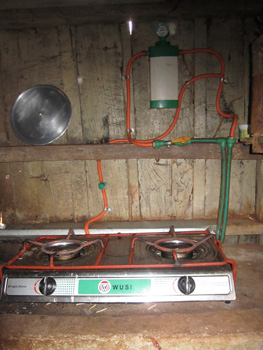
Dairy cows produce as much as 62 kg of manure per day, and it’s being put to good use in Kenya, where it’s being converted into biogas and used as a source of energy for some of the country’s poorest families.
Growing up in Kenya, Jane Ngobia understands the needs of her community in Nyeri County, where she has launched an initiative with several partners to provide Kenyan families with biogas reactors.
As assistant vice-president in the University of Guelph’s Office of Diversity and Human Rights, she sees parallels between empowering people to live better lives locally and abroad. Having taught leadership development at the University of Toronto and global citizenship at U of G, she wants her students to know they can “be the change” and become leaders today — and they don’t need to wait until they graduate or get a high-powered job to make a difference.
“For me, it’s all about empowering people; it’s human rights 101,” says Ngobia of the biogas project’s aim to lift people from the depths of poverty by providing them with energy, food, income and a better quality of life. All it takes is a couple of cows, pigs or chickens, their manure and a biogas reactor that costs about $1,000.
During a visit to Kenya last November, Ngobia partnered with Jodie Merrill, B.Sc. (Env.) ’06 of ENVIRON, and Madiha Khan, a recent master’s graduate in biomedical engineering from McMaster University, to submit a proposal for about $20,000 to fund the biogas pilot project. The money purchased biogas reactors for 10 families and established a resource centre to provide education and training to locals. Each family eventually repays the loan so the money can be used by other families to purchase their own biogas reactors.
Ngobia says she sees many challenges during her annual visits to Kenya, including women spending several hours each week collecting firewood to fuel their stoves. That time could be better spent doing more economically productive activities, she says, adding that chopping down trees and burning them is also an unsustainable practice and contributes to air pollution.

Ngobia sees the potential for university-wide research collaborations on the biogas project. Better breeds of cows could produce more milk that families could use for themselves or sell for money to improve their households and send their children to school. Improved veterinary care and cattle feed could help keep the cows healthy, producing more manure for biogas and crop applications.
“The potential for this project is endless,” she says.
She says empowering people with tools that help them become self-sufficient is more effective than giving them aid.
“It’s like giving people a cake. Instead of teaching them how to bake a cake, you have to come back and give them another cake because they have eaten it.” If people learn how to produce and sell milk following food safety guidelines, they will have a consistent source of income and a safe food supply, she says. Installing the biogas reactors also creates jobs for local workers.
Ngobia plans to return to Kenya later this year to monitor the project. She invites anyone interested in getting involved to contact her at jngobia@uoguelph.ca.